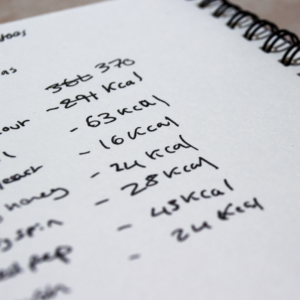Lose Weight Without Counting Calories
 While I do believe tracking and logging your nutrition is a worthwhile learning experience, I know not everyone will do it. And the good news is, that’s not the only way to reach your goals. If you some weight to lose and you’re already strength training, making a few behavioral changes around eating will lead to fat loss.
While I do believe tracking and logging your nutrition is a worthwhile learning experience, I know not everyone will do it. And the good news is, that’s not the only way to reach your goals. If you some weight to lose and you’re already strength training, making a few behavioral changes around eating will lead to fat loss.
Here are 10 changes you can make to lose weight without counting calories:
1.Drink 100oz of water daily
If you’re under-hydrated, you won’t feel good physically and your judgement will be compromised. That means you won’t make the best decisions when it comes to your nutrition.
2. Avoid or limit ultra-processed foods (including fast food)
A study found that when people were allowed to eat as much as they wanted, those who ate highly processed foods ate on average 500 more calories every day compared to the group eating whole foods. Ultra-processed foods (foods with more than 7 ingredients or with ingredients you can’t find in your pantry) are very calorie-dense (and usually NOT from protein), they are hyperpalatable (that blissful mix of fat, sugar, and salt), and they have ingredients known to affect the gut lining and disrupt your body’s natural signals of fullness.
3. Eat a full serving of protein with every meal
Protein has the highest thermic effect of the 3 macronutrients. That means you burn the most calories simply digesting protein compared to carbs and fat (protein about 30%, carbs 5-15%, and fat 0-3%). Protein is your best friend when your goal is fat loss. Ideally you’re eating 1g/lb of body weight (or goal weight if you have a lot of weight to lose). To hit that target, you’ll need a full serving of protein 3-5 times/day. A full serving is 20-40g. If you’re eating animal protein, aim for the lower end of the range. If plant-based, aim for the higher end. If you’re in your 20’s or 30’s, aim lower. If you’re 40+, scale up.
4. Have colorful vegetables with every meal
Fiber helps keep you fuller longer. Colorful vegetables provide the phytonutrients you need for optimal health. Weight is a symptom of health, not a cause. That means focus on getting healthy and weight-loss will follow. If you focus solely on weight-loss, you’ll compromise your health (and you won’t lose weight either).
5. Your breakfast should resemble lunch or dinner, not dessert
Think savory foods for breakfast. And don’t forget about that full serving of protein! Have eggs or plant-based (high-protein) burgers or tempeh. If you really can’t stomach that in the morning, have Greek yogurt or a protein smoothie.
6. Have defined meals rather than grazing throughout the day
If you’re grazing in an attempt to eat less, you’ll mostly likely end up undereating crucial protein and you’ll find yourself overeating at night because your body will be craving the nutrients its lacking. Also, your body needs times to go through the cycles of eating and digesting. Allow time between meals to digest rather than restarting the process by continually eating.
7. Slow down
Studies have found that people who eat slower have a healthier body weight. Try setting a timer for 20 minutes and take that entire time to finish a meal. Follow the rule that if food is your mouth, the fork isn’t in your hand.
8. Keep a consistent meal schedule
Your brain and many organs in your body have internal clocks. For optimal health, all these clocks need to be in sync with each other and with the external world, specifically day and night. Those clocks are affected by light and your activities, like sleeping, exercising, and eating. Eating on a consistent schedule every day (even weekends) helps regulate your circadian rhythm. Studies have found that keeping meal timing consistent leads to greater thermic effect of food (burning more calories during digestion) and better glucose response. This means your metabolism is working as it should. And when your metabolism is healthy, you can lose weight and keep it off. Read more about meal timing here.
9. Stop eating 2-3 hours before bed
Continuing with the theme of circadian rhythm, humans are not nocturnal. We are meant to sleep at night and be active and eat during the day. Studies have found that, in the morning, food has a great thermic effect (you’re burning more calories during digestion) and you have greater insulin sensitivity (that means lower blood sugar levels). Eating larger meals earlier in the day leads to less body fat, lower triglycerides, lower blood glucose, and less hunger throughout the day. Many women’s health experts agree that the popular method of Intermittent Fasting (skipping breakfast and eating into the night) does not work for women. Women will get much better results starting the day with a high-protein, low sugar breakfast and then stopping eating at a reasonable time in the evening. If you’re following Ayurvedic guidelines, have your last meal at 7pm and be in bed by 10pm. If you have your science hat on, don’t eat past 7pm when melatonin starts to rise.
10. Avoid or limit alcohol
Pop quiz! How many calories does alcohol have per gram? Here are some hints: Fat has 9kcal/g and protein and carbs each have 4kcal/g. Alcohol has 7kcal/g. 7! And no nutrients to go with it. It’s all “empty calories.” Not to mention that alcohol affects your decision-making, lowers inhibition, leads to poor sleep, and is dehydrating. The indirect effect of alcohol is poor choices when it comes to your nutrition and exercise commitments.
If this sounds like a lot, remember to start small. Pick one of these, the one you’re willing to do, and take one small step. When that has become as automatic as the habit of brushing your teeth, take it one step further or add another behavior. Keep repeating this process until you’ve reached your goal weight. And then keep doing it every day for the rest of your life. That doesn’t mean you have to perfect every day. But it does mean that you have to create lasting lifestyle changes in order to to have sustainable results.



